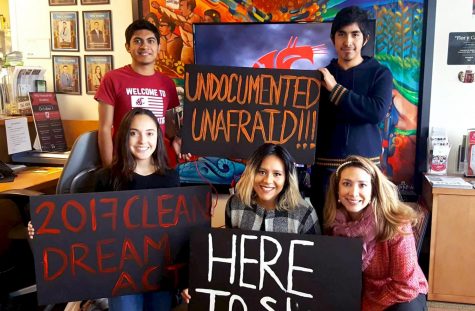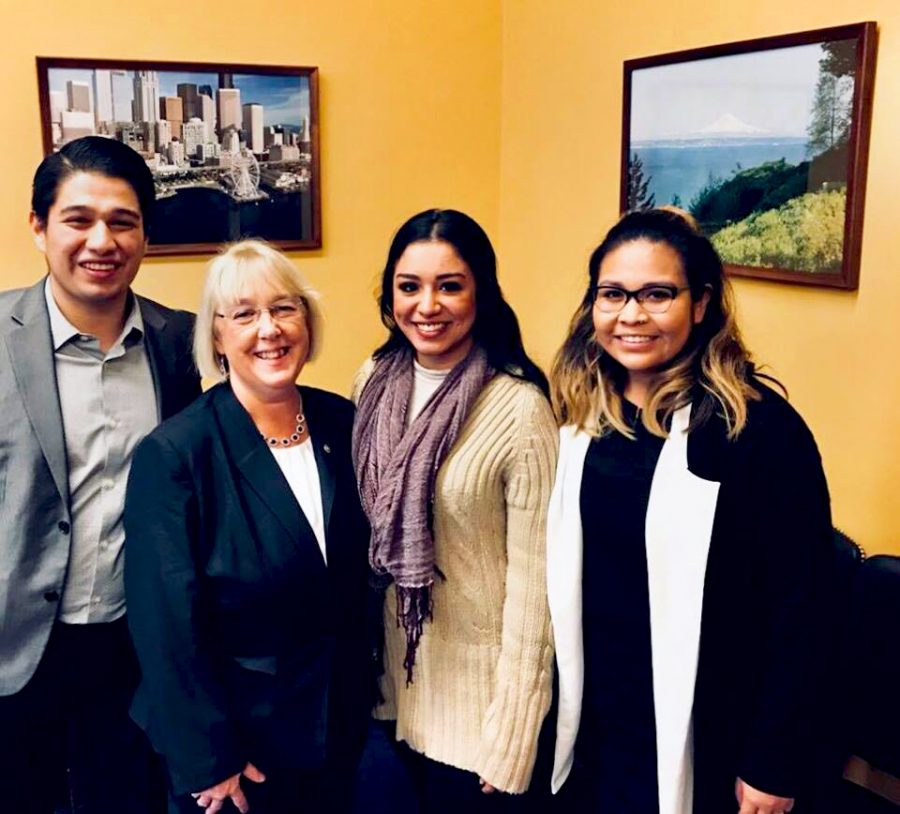Students to promote clean DREAM Act on campus
Crimson Group to share stories at public forum, march in D.C.
Cinthia Vazquez, and Maria Yepez, co-chair of the Crimson group, met with U.S. Senator Patty Murray and Paul Quinonez Figueroa, from the Washington Dream Coalition, during their trip to D.C. for the National Day of Action this summer.
November 8, 2017
Like many young undocumented immigrants, Brenda Rodriguez, a senior women’s studies and Spanish double major, is working to improve her own future.
Fortunately, she said, she renewed her Deferred Action for Childhood Arrivals work permit before President Donald Trump rescinded the program, which protected some young undocumented immigrants from deportation and allowed them to obtain a Social Security card.
Other students in the Crimson Group, an advocacy club on campus that works for immigration reform, have not been so fortunate, having only six months left in their DACA permits or no protections at all.
She said many members of the club fit the Development, Relief Education of Alien Minors Act narrative, as they were brought as children with no memory of a life before. Often, they don’t realize how differently their lives will be until they are faced with applications in their late teens that require documents they don’t have.
“Those were the moments in our lives that we really realized that we are not the same as everyone else,” she said.
Rodriguez and the rest of the club will hold a forum on the DREAM Act to educate fellow students, faculty and community members on how they can become allies at 4:15 p.m. Thursday in CUE, Room 203.
Simultaneously, three members of the Crimson Group travelled to Washington D.C. to join in a march and meet with Congressional leaders to discuss their position on the DREAM act. This is part of a national movement of walk outs and demonstrations to bring attention to the act.
The DREAM Act, first proposed in 2001 and reintroduced repeatedly over the years in different versions, would direct Homeland Security to grant lawful residence to undocumented immigrants who have been in the U.S. for four years before the bill was enacted, were younger than 18 when they immigrated or are currently in the education system.
Rodriguez said the bill must be passed by December, or many students will be left without options come graduation time.
Activists are working to promote what they call the clean DREAM Act, a version of the bill passed with no amendments, such as increasing funding or directives for detention centers, Immigration and Customs Enforcement or deportations.
Rodriguez said their group had considered a walk out similar to what the Crimson and other student groups have done in the past year, but realized those types of activities might not achieve their overall goal: informing their peers and demanding action from Congressional leaders, such as the representative for Eastern Washington, Cathy McMorris Rodgers.
“It will probably not lead to the co-sponsor of the clean DREAM act, just politically speaking,” she said. “But, we still want to create the pressure and we still want to public shame her for not including us as a priority in her agenda.”
She said the club had also considered partnering with other organizations to bring the concerns many students have about WSU cutting retention counselors in Multicultural Student Services, by partnering to hold a walk out for the DREAM Act, but feared their message would be lost.
“We just want our space,” she said. “We can be focused completely on the clean DREAM Act without having anything else shadow that or without us taking attention away from anything else either.”
Rodriguez said the intent of the forum is also to humanize the DREAM Act and show how it’s affecting students on an individual basis.
“It’s not just something that’s happening at a state level or a national level,” she said, “it’s affecting members of this community, students that we go to class with.”

Counterclockwise from the top left, Jesus Policarpo, Daniela Reyna, Brenda Rodriguez, Marcela Pattinson, Caryl Hernandez will be at the panel tomorrow starting at 4:15 p.m.
Another member of the Crimson Group, Jesus Policarpo, a junior computer science and Spanish double major, has never been eligible for DACA. He immigrated to the U.S. in 2012 at the age of 13. When in effect, DACA required applicants to be continuously living in the U.S. since 2007, and neither him nor the rest of his immediate family meet that requirement. He said now his only hope for a future career and life in the U.S. is either to marry a citizen, or through the passage of DREAM Act.
He said because of that, he currently can’t work in the U.S. and is only able to pay for school through the Washington Application for State Financial Aid. With no way to use his degree in country, he is uncertain as to where he will go after graduation.
“My only hope right now is if the clean DREAM Act gets passed,” he said, “If it’s not, I’ll probably have to get married or go back to Mexico or some other country, find a way, because even if I try to get a visa again, I don’t know how long it would take.”
He said his parents attempted to immigrate legally, applying first for a visa in the early 2000s, as well as refugee status when their family was targeted by organized crime. He said they received a reply four years after their initial request. The response from immigration was a notice that it would take longer to process the application.
In their first attempt to cross the border, they were caught and detained, and then sent back to Mexico. On a later attempt, they made it through.
Rodriguez crossed the border when she was 9. Policarpo, she noted, is the only member that has been detained in a detention center.
They said an additional focus of the forum was to dispel myths that surround undocumented immigrants, such as the belief that they get free benefits and don’t pay taxes.
“All these things, the taxes we pay and everything,” Policarpo said, “we can’t [obtain] because we’re not citizens.”
Rodriguez hopes to go to graduate school and study to become a professor. Graduate programs, however, often require students to work for the university as a part of their program, which will also take longer than the remainder of her DACA work permit.
She said Washington has progressive policies toward undocumented immigrants, but other states do not. She was considering Arizona, but is concerned because of the policies and proximity to the border, and what might happen if her protections expire and no immigration reform legislation has been passed.
“That was kind of the moment that I realized,” she said, “my search has to include [questions] like, ‘who’s the governor, what are the politics, how exposed will I be if my permit ends and now I’m undocumented?’ ”
She said though the DREAM Act is important to her, she recognizes it’s just the first step and it really only addresses young immigrants. The most important part of this forum, and the DREAM Act itself, is to make sure it does not penalize those outside the DREAMer narrative, specifically the parents and extended family members who brought them to the country as children, she said.
“Sometimes in that process, you’re going to break some laws,” she said. “You are going to do some things that are frowned upon by normally what we do in society, but it’s what we have to do to stay alive and live as decent human beings. If we could do it the right way, we definitely would.”
Editor’s note: This article has been updated from its original version.











